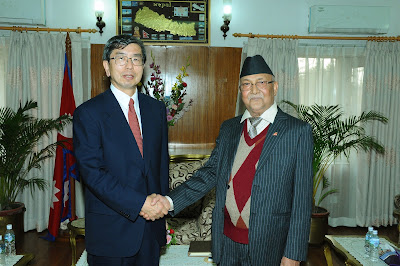Acting Secretary of the National
Reconstruction Authority (NRA) Madhu Sudan Adhikari Thursday said that the
reconstruction and rehabilitation works would be executed through the line ministries
as the Authority did not have administrative structure required to implement
the task.
“The reconstruction works would
be carried out in a faster and efficient way if it is given to the ministries
that have been long involved in the same type of job. We hope that this
implementation model will work,” he said while addressing a two-day seminar on
‘Media sensitization on post-earthquake green recovery and reconstruction’
jointly organized by the USAID, World Wildlife Fund (WWF) and Nepal Forum of
Environmental Journalists.
However, he said that present
structure and working-style of the ministries lacked efficiency.
“Therefore, new project implementation
units would be created in respective ministries as per the directives of the
reconstruction body, and programs will be launched to enhance their capacity
and empower them with latest knowledge and technologies.”
Those units will have the
administrative structure as that of a government department, he said.
According to Adhikari, there will a central level
project implementation unit to execute bigger projects while small projects of
reconstruction will be carried out by the district level project implementation
unit.
While presenting the execution
concept of the reconstruction programmes and institutional structure to Prime
Minister KP Sharma Oli on Wednesday, NRA chief executive officer Shushil
Gyawali said that the reconstruction body would directly disburse the budget to
the project implementation units in the ministries in order to carry out the
impending task of rebuilding the structures damaged by the devastating
earthquake in April and May last year.
The NRA also planned to bring
skilled and efficient manpower from other sectors if required.
Adhikari assured that green
reconstruction concept would be applied in the reconstruction as far as
possible. “There is a challenge to balance between environment and
conservation. We are working with other stakeholders to expedite the
reconstruction while considering the environmental aspects.”
Sadhana Ghimire, team leader of
Conflict Prevention Programme, United Nations Development Programme (UNDP) said
that permanent job creation, improved quality of life and adequate income
should be the post-quake sustainable development goals.
Raju Man Manandhar, superintendent
engineer of the Department of Urban Development and Building Construction, said
that the government would initiate land pooling projects in some of the core
city areas in order to build quake-resistant buildings, and also to create
space and maintain green environment.
He informed that the government
was planning to develop Barpak village
of Gorkha as a model
human settlement.
Dr. Pralad Thapa, team member of
Rapid Environment Assessment conducted by the Ministry of Science, Technology
and Environment in the aftermath of the quake, urged the government and NRA to
develop livelihood opportunity of the people and resettlement simultaneously.
He also stressed to carry out
the reconstruction works without affecting the biodiversity.
Rajendra Dahal, press advisor to
the former President Dr. Ram Baran Yadav, said that every transition period in
the country had detrimental impacts to its natural resources including forest,
water and sand.
He criticised the government for
delaying the post-quake reconstruction, and urged the media to be more vigilant
in order to create pressure on the government to conduct reconstruction works
at the earliest possible.
Yubaraj Ghimire, editor of the
Annapurna Post daily, said that environmental concerns might occasionally halt
the development work.










